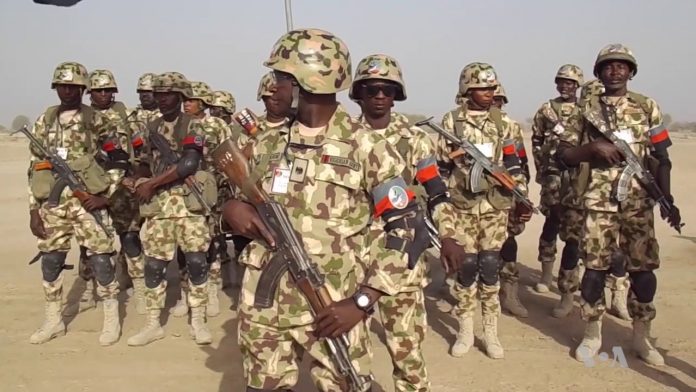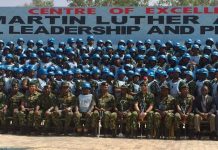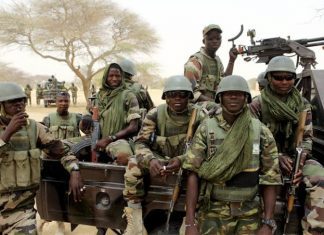By Philip Agbese
The Nigerian Senate, and the opposition Peoples Democratic Party (PDP), portrayed a lack of understanding of the security situation in Nigeria, when the two commented on the efforts of the Armed Forces and the current set of service chiefs towards combating insecurity in the country.
Our Senate had demanded that the service chiefs step aside over what it called the deteriorating security situation in the country following the consideration of a motion on the rising number of casualties among the Nigerian Army and other security services. While the PDP said in addition to his refusal to change his service chiefs and inject new blood into the nation’s security architecture, President Muhammadu Buhari had failed to lead from the front as he promised during his campaign.
The Senate, realizing it had goofed on the matter tried to make amends with the sponsor of the motion, Senator Ali Ndume saying that was not the intendment of his motion. But the PDP ever eager to latch unto any criticism of the President Muhammadu Buhari administration, tried to make huge capital out of what it thought was an opportunity to ridicule the government and echoed what the Senate said.
But in a swift reaction, Special Adviser to the president on media, Femi Adesina said the president will do only what is in the best interest of the country at all times and that the prerogative to remove the service chiefs lies with the President.
It was a kind of retort, diplomatically telling the lawmakers and the opposition party, that they were ignorant of the matter and that it would be better left for the president, who is experienced in the field to handle. The positions taken by the Senate and the PDP on the matter however symbolizes the impulsive manner Nigerian politicians react to issues that require deep research and thorough investigation.
Unlike in other climes where basic parameters for assessing the effectiveness of the military are well stated and interpreted only by experts, in Nigeria, the parameters for such are drawn from the last combat engagement and interpreted by the general public without recourse to the basic yardsticks. That was why when between April and early July, when the Nigerian military sustained its onslaught against all forms of threats to national security that included terrorism, insurgency and banditry and killed many of the criminals, the atmosphere was a bit different as many sang the praises of the armed forces. The sustained offensive recorded a series of successes against the Boko Haram and ISWAP terrorists fighting on the fringes of Lake Chad region such that in March, Nigerian troops eliminated not less than 20 top Boko Haram commanders including one Abu Usamah, and over 100 of their fighters who were hiding in Kwalaram, Ngilewa, Sabon Tumbu, Bukarmairam, Wulgo in the Marte and Gamboru Ngala axis as well as in Gorgi, Damboa local government of Borno State.
The troops followed up on that with the killing of 105 insurgents in Buni Gari and captured many weapons in April and on the heels of that in May, killed 134 of ISWAP and Boko Haram members and arrested 28 of their informants and overran their camps in Durfada, Allafha, Timbuktu, Bulajibi and Gonikurmi near the Sambisa forest. By the time the Chief of Army Staff, Lt. General Tukur Yusuf Buratai went to report to the President and Commander in Chief about what transpired at the theatre of operation, about 1400 of the criminals in the Northeast were killed while another 600 bandits were neutralized in the bushes of the Northwest where they were terrorizing people. This is aside the fact that the military had previously recorded other feats like retaking 20 local government areas taken over by the terrorists, freeing many captives held, repelling many attacks and destroying their camps.
But immediately the insurgents launched a surprise attack on communities in Borno and Katsina States, the applause was quickly replaced with calls for the removal of service chiefs.
These impulsive responses to military engagements, have not only misguided the thoughts of the public on the overall performances of the armed forces but has allowed mischief makers to mislead the public in terms of what constitutes the reality on ground.
A researcher once puts it that the ultimate yardstick of national power lies in its military capability because countries subsist in an environment where internal and external threats to security are both common and ever-present. Another researcher, Peter Paret wrote that “military power expresses and implements the power of the state in a variety of ways within and beyond the state borders, and is also one of the instruments with which political power is originally created and made permanent.”
Hence, the parameters used to gauge military prowess the world over are not based on perception but include the size of the country’s defense budgets, manpower, infrastructure, defense industrial base, war-fighting inventory and support as well as its conversion capability.
If one is to assess the Nigerian military on these bases, it is only fair to conclude that they have done well as all the parameters are blinking on the positive side. Since the coming of this administration for instance, the size of the budget allocated to defence has increased tremendously, while there have been conscious manpower drive that has increased the number of personnel in service.
The number of facilities to enhance efficiency and training have also been developed while the defence industrial base has been strengthened and now produces quite a number of sophisticated weapons.
The new strategies brought in by the service chiefs in combat operations have also proven the conversion capability of the Nigeria Armed Forces.
Security experts have explained that contrary to what people know, the person leading the war against terrorism and insurgency in Nigeria, is no other than the President himself but with the active support of the service chiefs.
One of the security experts who took his time to educate people on what is happening in the Northeast, said it is the Commander- in-chief of the armed forces who holds the coordinates that combine to determine the structure, approach, strategy and results on the battlefield hence every victory at the theatre of operation must be attributed to him.
“This is the reason why every planning starts with the Commander- in -chief while he is also briefed from time to ensure that the overall operation does not go out of his plan,” he stated.
He said the series of victories have restored peace in the Northeast and given the people hope that it remains a matter of time before the region would be permanently rid of the activities of the insurgents adding that any military operations won back to back must be as a result of careful planning and sophisticated strategies at the highest level.
Recently, another group, The Oduduwa Youth Vanguard, OYV, also commended President Buhari and the Service Chiefs for putting the heat on Boko Haram terrorists such that they are not able to operate beyond a tiny fringe in the Lake Chad region.
President of the OYV, Comrade Emmanuel Kolawole Abe,
said it is an indication of the sustained pressure against the terrorists that they have not been able to move about and cause havoc around the country as they wish but resort to hiding in border towns between Nigeria and other neighbouring countries to launch surprise attacks on soft targets just to give the impression that they exist.
The activist said anyone with fair knowledge of warfare would confirm that such tactics as deployed by the Boko Haram now are used by the losing side in a war as a means of propaganda.
The Institute for Peace and Counter-Terrorism Studies in a commissioned research into the operations of the Nigerian Military in North-East Nigeria for January to April, 2020 also gave the military a pass mark.
It said, “A critical survey revealed that between 2018, 2019, and 2020 the Nigerian Military rescued a total number of 12,500 people from the captivity of Boko Haram in parts of Yobe and Borno State.
“The Nigerian Military have been actively involved in the war against Boko Haram in North-East Nigeria, and that has seen several casualties from both sides. However, it was observed that the Boko Haram fighters have been at the receiving end of a continuous military onslaught that has led to the neutralization of Boko Haram terrorists, as well as other criminal elements.”
The institute said the sustained military operations against the Boko Haram group also led to the death of scores of Boko Haram fighters and said over 350 Boko Haram fighters were killed in the past month in North-East Nigeria, and over 500 sustaining life-threatening injuries.
It added: “Nigerian troops have been able to sustain the tempo with the introduction of additional counter-terrorism methods, as well as a boost in their military hardware that gave them the edge and with superior firepower over the Boko Haram group.
“It was also observed that the operational strategy of the Nigerian Military have indeed placed the Boko Haram fighters on the brink of defeat baring all unforeseen circumstances. As per the concluding part of the research work, it was established that 762 Boko Haram fighters lost their lives in battle with the Nigerian troops led by the Military Chief in Nigeria, Lt. Gen. Tukur Buratai as the odds are against it.”
The Chief of Army Staff, acknowledged this much in a speech when he reiterated the commitment of the Nigerian Army in winning the insurgency war in the northeastern part of the country.
He said the country had witnessed difficult and escalating security challenges with the Boko Haram insurgency being at its peak upon assuming office in 2015 but that the Nigerian Army has been at the forefront of combatting these threats of insecurity.
He said, “From 2015 when I assumed office, my immediate priority centered on modernizing the Nigerian Army by addressing the major challenges and fundamental areas. The measures put in place in the last five years have no doubt contributed immensely towards enhancing the efficiency of the Nigerian Army resulting in improved security across the country,”
No doubt, President Buhari has improved on the size, proficiency and intellect of the armed forces with the support of the current service chiefs.
The Nigerian military has moved from the point where it was five years ago when it was being helped by the personnel of other foreign countries to go into combat.
The boost in quality and personnel many say, is why Nigeria is no longer talking about hiring mercenaries to help it defend its territorial integrity and to assist the civil authority in maintaining peace.
It is projected that if the feat is sustained, President Buhari would by the end of his eight year tenure be leaving Nigeria with one of the most efficient and robust military in the world.
It is important that both the Senate and the PDP should take note.
Agbese wrote from Katampe, Abuja.
Join Television Nigerian Whatsapp Now
Join Television Nigerian Facebook Now
Join Television Nigerian Twitter Now
Join Television Nigerian YouTUbe Now





